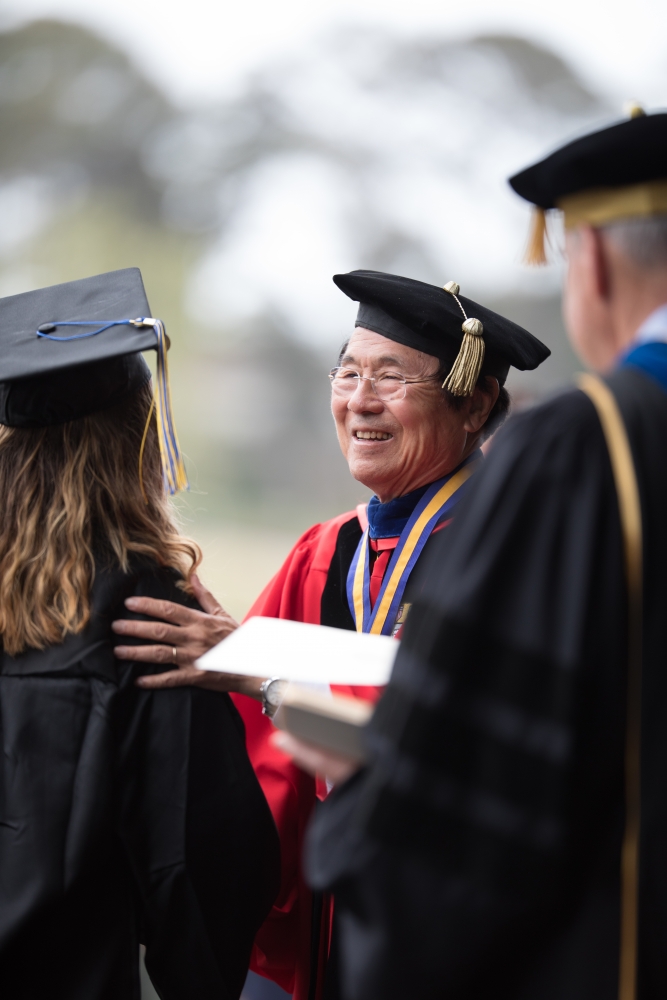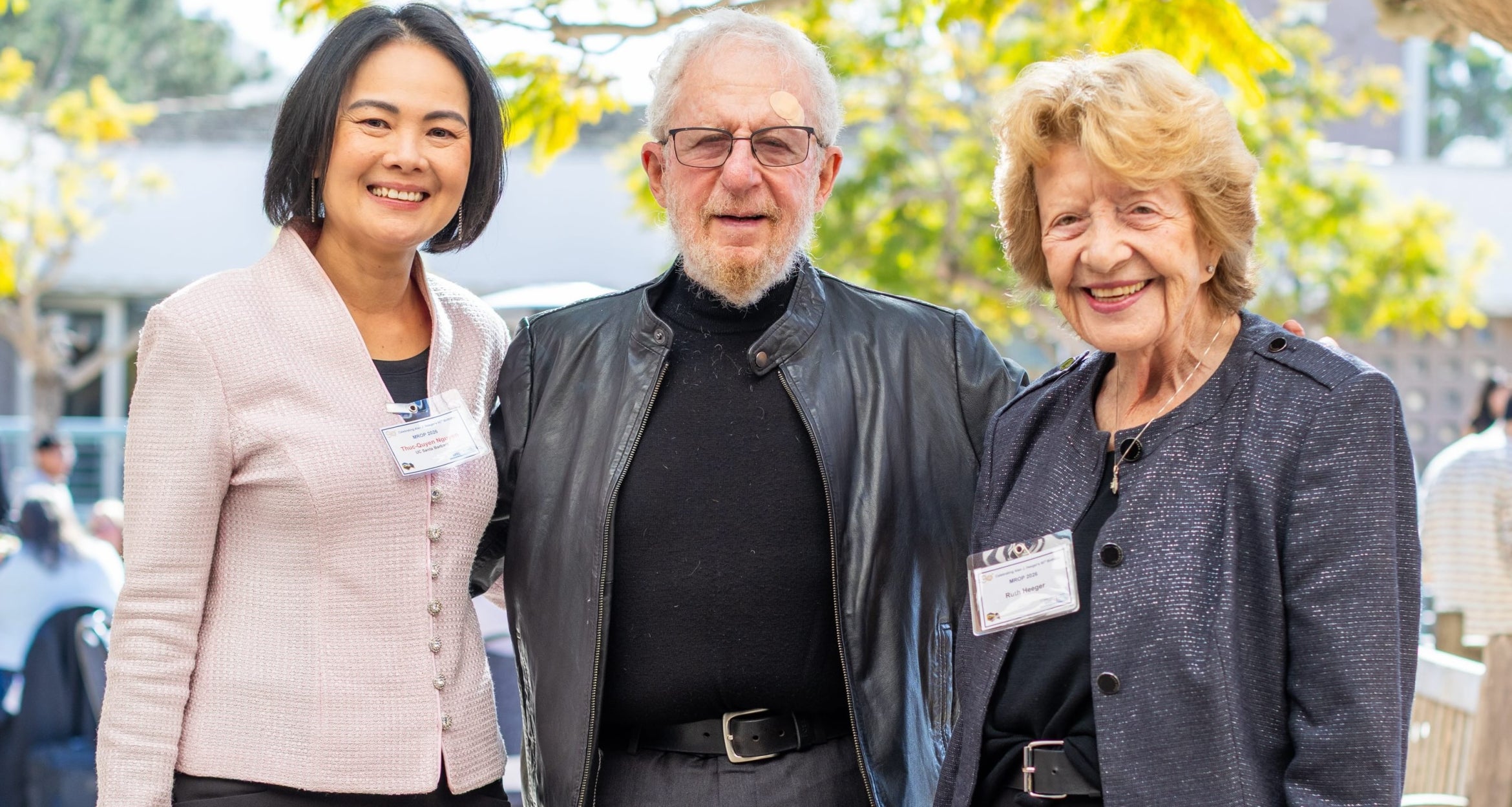
Key Contributors
Four graduating seniors have been honored for their outstanding contributions to undergraduate research at UC Santa Barbara.
The Chancellor’s Award for Excellence in Undergraduate Research for 2019 has been awarded to Maya Chatterjee, who will earn a bachelor of art degree in sociology; Maya Garabedian, who will receive her bachelor of art degree in interdisciplinary studies; Kevin Ruan, who has completed a bachelor of science degree in biological science; and Zizhuang Wang, who will receive a bachelor of science degree in computing from the College of Creative Studies.
In her senior year, Chatterjee completed an honor’s thesis analyzing media coverage of mass shootings, specifically examining differences in media depictions of mass shooters of different races. Tristan Bridges, an assistant professor of sociology and advisor on the thesis, described it as “an incredibly important contribution to research on mass shootings in the U.S.”
Chatterjee’s thesis examined one part of a larger project by Bridges and Tara Leigh Tober, who have assembled a new dataset of mass shootings in the U.S. between 2013 and 2018. They invited Chatterjee to serve as a research assistant on their endeavor, and to be part of some resulting publications.
“Maya has made an important discovery and broke ground in this field deploying new methods to help us gather data on a scale previously not seen in research on mass shootings,” Bridges wrote in nominating Chatterjee for the award. “Maya is the strongest undergraduate student I have ever instructed or worked with. I recommend her in the highest and without reservation.”
Chatterjee will next pursue graduate work, either in sociology at Oxford or at the London School of Economics. She has been accepted to both.
Studying in the departments of English, religious studies and the history of art and architecture, Maya Garabedian focused on arts and cultures of the Middle Eastern region in her pursuit of a degree in interdisciplinary studies. For her senior project, she produced a collection of creative non-fiction, “Contemporary Diasporic West Asian Life Writing: Out of America, Syria, and Lebanon,” which features stories from her family told through multiple points of view, including her own, and research that contextualizes French and Armenian terminology, and supports understanding of the Armenian Genocide and Lebanese Civil War.
Garabedian worked on the project with English professor Shirley Geok-lin Lim, who nominated her for the award. Lauding her student’s “wide-ranging curiosity, broad interest in the arts and humanities and a deep regional concern with the Middle East,” Lim said that in her life writing seminar course, Garabedian was “the most distinguished writer in her cohort.”
“Ms. Garabedian’s writing is vivid, lucid, sharp, funny, deeply moving and absolutely original,” Lim wrote in her nominating letter, “and when it will be published, as I have no doubt it will, her mixed-genre memoir — composed through methods associated with history, literary studies, linguistics, anthropology and composition — will be a significant new contribution to U.S. ethnic literature and a brave new voice in the global Armenian diaspora.”
Garabedian is now working on a book-length manuscript that weaves together a historical survey of Armenia, and literary and linguistic analysis of selected texts, with a memoir of her extended family’s survival of genocide and resettlement and her own life experiences.
With a strong interest in medicine, Kevin Ruan sought out biomedical research opportunities from the start of his freshman year, and by his second quarter joined the lab of Professor Stu Feinstein, the only undergraduate student to do so. Ruan’s research focus is in the tau protein associated with Alzheimer’s and other neurodegenerative diseases. His work on tau in Feinstein’s lab resulted in his co-authorship of a paper that is now in review.
“Kevin has established unequivocally that he is on to something fundamentally important and he is in the enviable position of sorting out the exciting details,” Feinstein wrote in nominating Ruan for the Chancellor’s research award. “Any way the data come out, it will be important. This doesn’t happen often in science.
“In all of his work, Kevin has been simply outstanding,” Feinstein continued. “He has shown intelligence, passion and a tremendous work ethic. He owns his project and asks great questions. He is technically outstanding and his work is completely reproducible. He is the complete package. Despite being an undergraduate, I engage with him at the level of a superb senior graduate student.”
Ruan plans to continue at UC Santa Barbara – and continue his research on tau — as a master’s student. He hopes ultimately to earn an MD-Ph.D.
Working with Professor William Wang, in the Department of Computer Science, CCS student Zizhuang Wang took on a research project to design artificial intelligence algorithms for text modeling — specifically, designing methods for text generation. Their resulting paper was submitted to a top journal, Natural Language Processing, receiving “unanimous strong accepts from three blind reviewers and accepted as an oral paper” at a prestigious conference, William Wang wrote in his nominating letter for Zizhuang.
“Note that the conference received almost 2,000 submissions, and the oral paper presentation acceptance rate is around 5 percent. It is very unusual for a second-year college student to publish at such top venues,” Wang stated. “This has demonstrated his research potential as well as leadership.”
Citing in particular Zizhuang’s understanding of maths and his programming skills, Wang called his student “the strongest undergraduate student that I’ve ever seen in my past 10 years at Columbia, Carnegie Mellon University and UCSB. I could see him being very successful in his career.”



